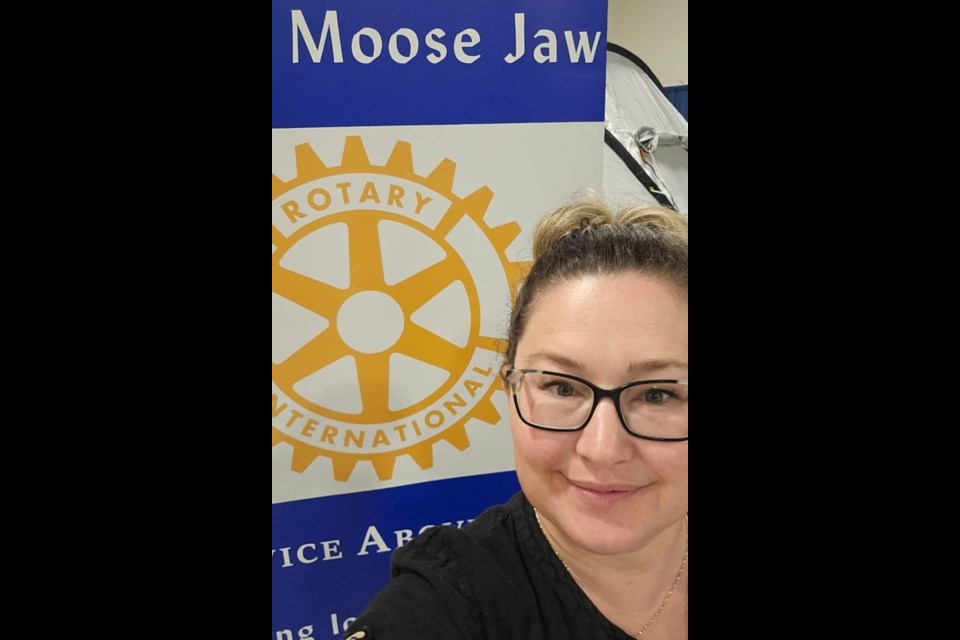MOOSEJAWTODAY.COM — Artist Laura Hamilton is known for creating female characters who are whimsical, sweet and romantic — and faceless — but they wouldn’t exist if she hadn’t pursued a healing journey to handle her post-partum depression and anxiety.
Hamilton was a creative child growing up, but she felt like she didn’t fit in and “felt a bit broken,” although she didn’t have the words to describe those feelings. Moreover, it was taboo to talk about mental health problems at that time.
It wasn’t until Hamilton was in her early 30s that she learned she had anxiety, which allowed her to discuss her challenges more openly.
“I believe the more we share and talk about it, the more the stigma disappears … ,” Hamilton told roughly 150 Rotarians during the Rotary International District 5550 conference in Moose Jaw on May 10.
Unexplained feelings
Hamilton experienced many major changes in her early 30s as she married, moved and began teaching. She had her first baby in 2010 and knew she was supposed to be happy, but only felt sadness, loneliness and irritability — and she didn’t know why.
She blamed her problems on homesickness, so her husband quit his job and moved them back to Moose Jaw. She gave birth to her second son a few years later and experienced the same overwhelming feelings.
Hamilton realized something wasn’t right when she had a major emotional meltdown, prompting her to visit a doctor, who diagnosed her with anxiety and post-partum depression.
Through research, she learned that having a baby can fill a mother with many emotions, from joy and excitement to fear and anxiety. However, some experienced post-partum “baby blues” — mood swings, crying and sleeping problems — lasting for weeks.
“I want you to know that it isn’t a character flaw or a weakness,” Hamilton said.
Her doctor placed her on anti-depressants even though she didn’t want them. She has attempted to stop taking them but says her husband and mother — who know her well — notice when she does.
“I take medication and I am OK with that, and I will till I die,” she added.
Beginning the creative journey
Hamilton returned to teaching after finishing her maternity leave, but because of all the changes she faced — a new school and split grades — her anxiety took over.
It was Nov. 3, 2014, when she experienced a massive panic attack at school. A colleague drove her home, where she called her mother-in-law, who suggested she take a journey of self-discovery.
Hamilton was 33 and realized it would be the perfect time to do that. She took a leave from work and, after speaking with a counsellor, returned to her childhood love of drawing as part of her recovery.
She began painting at her kitchen table, and since she was captivated by American artist Buzz Syler, she borrowed some of his techniques.
The first painting she created was entitled “Lucy in the Yellow Dress,” featuring a woman — her black hair covering her face — with a black dog. From this, “something magical happened,” as the artwork gave Hamilton a surge of adrenaline and sent creative energies coursing through her body.
“I felt so alive in this moment. This massive endorphin rush released dopamine — the feel-good chemical — (into her brain). It felt like a magical dance between myself, the water and the paint,” she said.
This moment helped her experience her “authentic self,” while the painting kick-started her healing and prompted her to quit her teaching career to become a full-time artist.
Brighter days
This was also when her paintings began to transition from dark colours to more cheerful colours, while the women in the paintings transformed into sweet, graceful, whimsical, free-spirited beings.
As for why her characters have no faces, Hamilton said they represent “the essence” of a person and can be whomever the viewer needs them to be, whether a mother, sister, daughter, niece, best friend, wife or even the viewer.
“My art has become my gift to connect to others. Through this journey, I have learned that art has the amazing ability to break down walls … ,” she added. “I believe we are all meant for complicated journeys, journeys of brokenness, vulnerability and courage. We all have our own Lucy story.”




